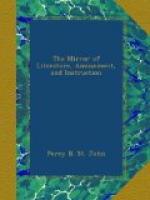Mr. C. observes, “this is very severe, very pointed, and very untrue. The Sigismunda of Hogarth is not tearing off her ornaments, nor are her fingers bloodied by her lover’s heart. It is said that the picture resembled Mrs. Hogarth, who was a very handsome woman; and to this circumstance Wilkes maliciously alludes in his unprincipled attack on her husband. ‘If the Sigismunda,’ says this polite patriot, ’had a resemblance of any thing ever seen on earth, or had the least pretence to either meaning or expression, it was what he had seen, or perhaps made—in real life—his own wife in an agony of passion; but of what passion no connoisseur could guess.’ That Mrs. Hogarth sat for the picture of Sigismunda seems to have been known to conscientious John, and this is supported by that lady’s conduct to Walpole. This noble biographer sent her a copy of his Anecdotes, accompanied by a courtly and soothing note; but she was so much offended by his description of the Sigismunda, that she took no notice of his present. The widow of the artist was poor—and an opinion so ill-natured—so depreciating—and so untrue, injured the property which she wished to sell: she loved too the memory of her husband, and resented in the dignity of silence the malicious and injurious attack. She considered the present as an insult offered when she had no one to protect her. I love her pride and reverence her affection.”
Of Hogarth’s house at Chiswick, we have the following slight notice:—
“The time was now approaching when superstition, and folly, and vice, were to be relieved from the satiric pencil which had awed them so long—the health of Hogarth began to decline. He was aware of this, and purchased a small house at Chiswick, to which he retired during the summer, amusing himself with making slight sketches and retouching his plates. This house stood till lately on a very pretty spot; but the demon of building came into the neighbourhood, choked up the garden, and destroyed the secluded beauty of Hogarth’s cottage. The garden, well stored with walnut, mulberry, and apple trees, contained a small study, with a head-stone, placed over a favourite bullfinch, on which the artist had etched the bird’s head and written an epitaph. The cottage contained many snug rooms, and was but yesterday the residence of a man of learning and genius, Mr. Cary, the translator of Dante. The change of scene, the free fresh air, and exercise on horseback, had for awhile a favourable influence on Hogarth’s health; but he complained that he was no longer able to think with the readiness, and work with the elasticity of spirit, of his earlier years. The friends of this artist observed, and lamented, this falling away; his enemies hastened to congratulate Churchill and Wilkes on the success of their malevolence; and these men were capable of rejoicing in the belief that the work of nature was their own.”
We are glad to see Mr. Cunningham throwing light on false conclusions drawn from the eccentricities of genius, as in this little anecdote:—




